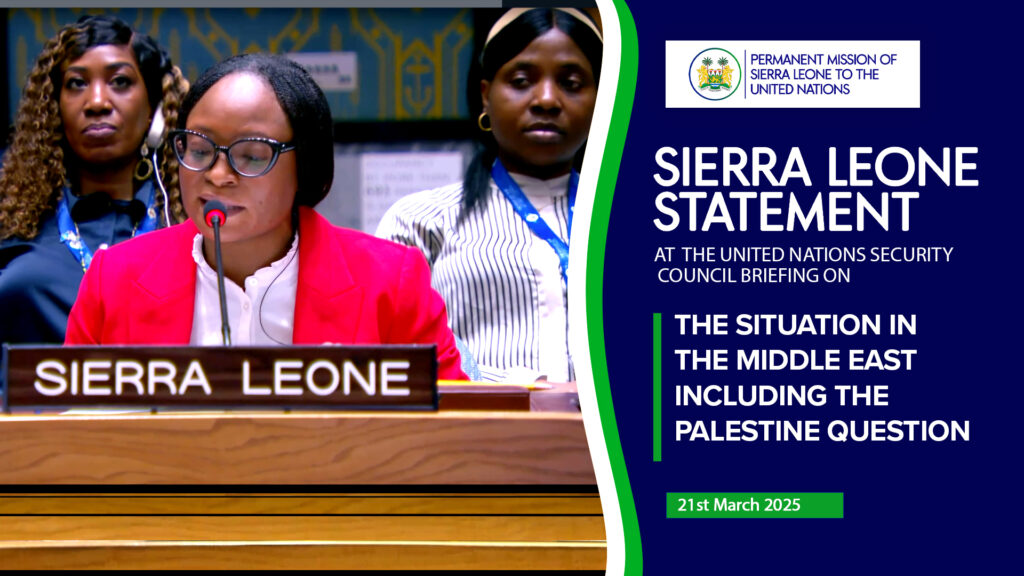STATEMENT BY
MS. SONIA KARIM
MINISTER COUNCILOR AND DEPUTY POLITICAL COORDINATOR
Thank you, Madam President.
I would also like to thank Ms. Sigrid Kaag, the United Nations Special Coordinator for the Middle East Peace Process Ad Interim, for her comprehensive briefing on the implementation of Security Council Resolution 2334 (2016) and the current situation unfolding in the Gaza Strip and West Bank.
The provisions of Resolution 2334 (2016) are unequivocal in outlining Israel’s legal obligations to protect all civilians. They specifically condemn actions aimed at altering the demographic composition of Palestinian territories, including the construction and expansion of settlements, home demolitions, and the displacement of Palestinian civilians, all of which constitute violations of international law. These actions represent a significant obstacle to peace and the two-state solution.
We regret that this reporting period has seen a significant escalation of tensions in the West Bank. Israel’s ‘Operation Iron Wall,’ which began around the same time as the most recent but now breached Gaza ceasefire in January, has resulted in intensified military operations in areas such as Tulkarem, Jenin, Nur Shams, Tubas, and others.
While Israel has reported that these operations are in response to militant activity, the military actions, combined with settler violence, raids, and confrontations between Israelis and Palestinians, have devastated refugee camps and communities. This has resulted in the tragic loss of about 50 lives, including children, and displaced tens of thousands of civilians. This represents the largest population displacement in the northern West Bank since the 1967 war.
Madam President,
A military solution will not resolve the Israeli-Palestinian conflict, as decades of bombings, airstrikes, and terror attacks have demonstrated. Israel’s violation of the Gaza ceasefire agreement and Hamas’ recent rocket attacks into Israel can only exacerbate an already fragile situation in the Occupied Palestinian Territory, plunging the civilian population further into devastation and suffering. Most troublingly, history has shown that such actions breed continuous cycles of hatred and violence, with deadly consequences for both Israel and Palestine, as well as the wider region.
Despite these seemingly intractable challenges, our goal should remain to define a path toward a peaceful resolution of this conflict that ensures the safety of all civilians, the release of all hostages, unimpeded humanitarian assistance, and a political horizon in line with international law.
With this in mind, we make the following three points: First, we remain deeply concerned that, as the humanitarian needs in the West Bank and Gaza Strip grow, the United Nations Relief and Works Agency (UNRWA), the main humanitarian organization in the territory, is facing severe security, administrative, and operational challenges that hinder its ability to serve the thousands of civilians reliant on its assistance. Despite Israeli restrictions on humanitarian aid to Gaza, UNRWA and other agencies, including the WFP and UNICEF, continue to provide life-saving food, water, medical care, and sanitation.
We condemn the killing of five UNRWA employees and one UNOPS staff member. Noting the statement by the Secretary-General’s spokesperson that the locations of UN facilities in Gaza are well known to all parties, we call on all parties to respect and protect UN and humanitarian aid workers in accordance with international humanitarian law. Simultaneously, we urge the international community to bolster support for humanitarian and reconstruction efforts in Gaza and the West Bank.
Second, Sierra Leone recalls General Assembly Resolution ES-10/24 of 18 September 2024, which addressed the International Court of Justice advisory opinion on the “Legal consequences arising from Israel’s policies and practices in the occupied Palestinian territory, including East Jerusalem.” This resolution calls for an end to all actions that harm the civilian population in the occupied territories and undermine the two-state solution.
We urge the parties to refrain from unilateral actions, provocations, incitement, and inflammatory rhetoric that erode trust, hinder dialogue, and obstruct the path to negotiations. Israeli settlement expansion in the West Bank and the demolition of Palestinian homes must cease immediately.
Third, we emphasize the critical importance of revitalizing the political process, which will undoubtedly pave the way for a negotiated two-state solution, promote sustainable development, and foster a just and lasting peace in the region. In this context, the international conference to be co-chaired by France and Saudi Arabia in June 2025 offers a crucial opportunity for consolidating positions and agreeing on concrete measures to establish a durable political and security framework for the region.
We also remain hopeful for the recovery and reconstruction of Gaza, guided by the proposal tabled by the League of Arab States in Cairo, Egypt. The Palestinian Authority must be supported in its efforts to build a safe and prosperous State of Palestine that lives in peaceful coexistence with Israel.
In conclusion, Madam President, let me reiterate that the call for all parties to act in accordance with international law, including international humanitarian law and the relevant Security Council resolutions, is not a mere formality. It is a reminder of each member State’s duty to uphold the principles of humanity, justice, and accountability, and to do so consistently, without selectivity or double standards.
I thank you.



